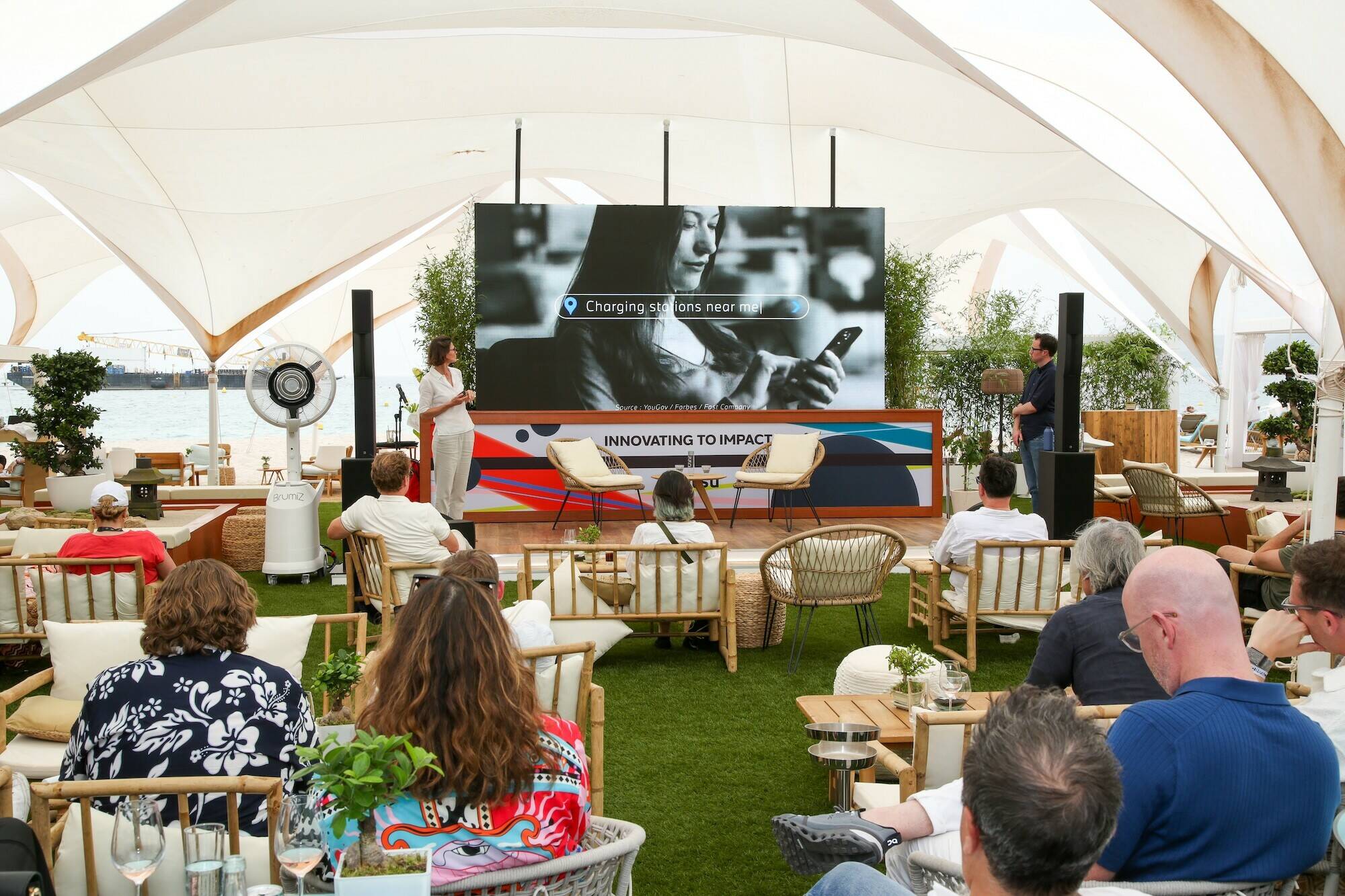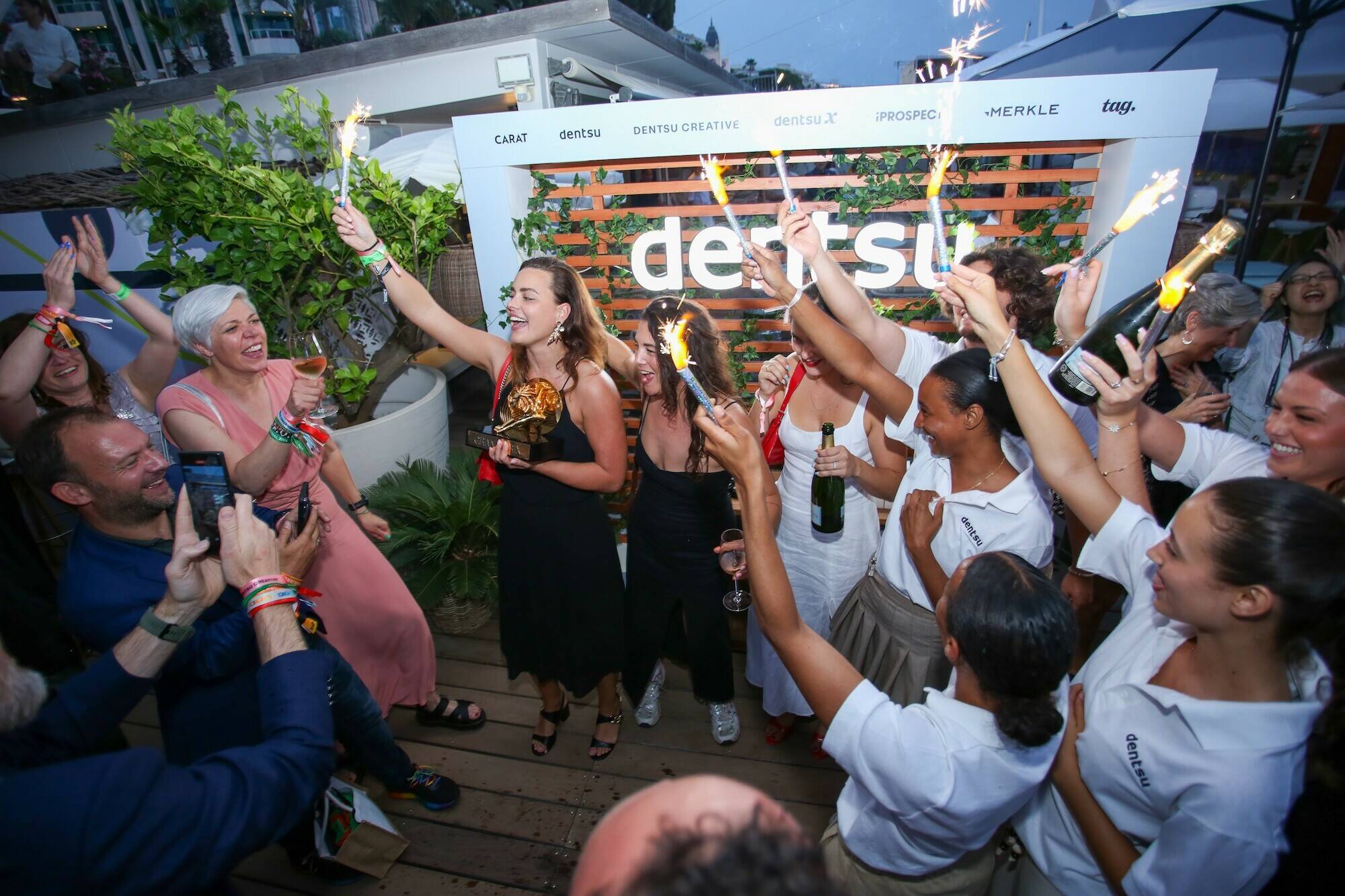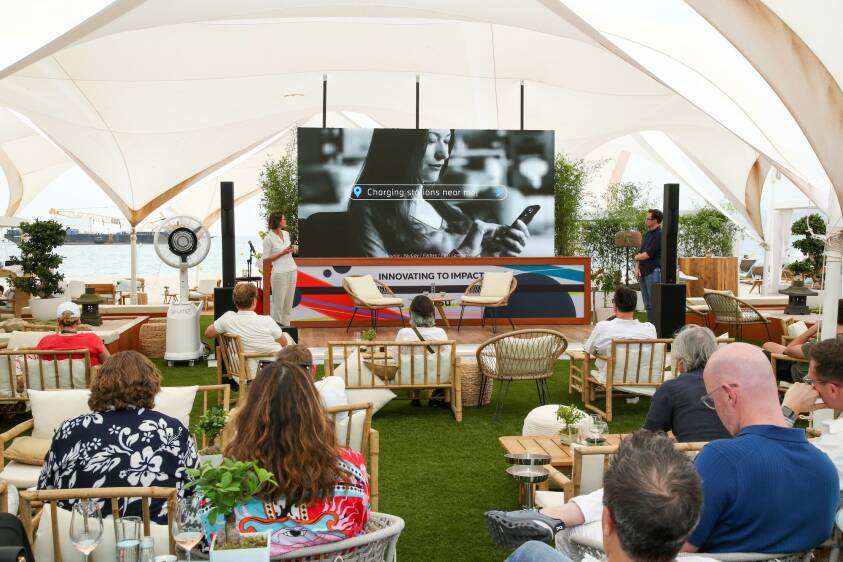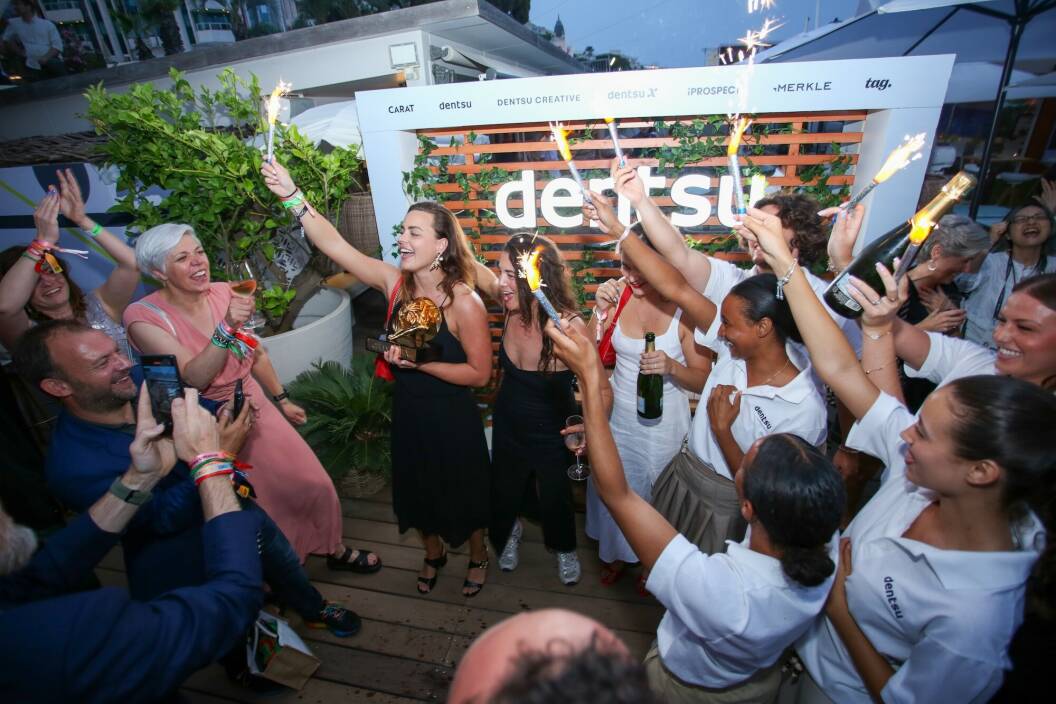
THURSDAY 20TH
DAILY RECAP
Fan-fuelled Creative Impact
A Thursday session at dentsu’s Beach House, ‘From Reaching Fans to Reaching the Senate: The Power of a Song’, focused on the role a fanbase can play in propelling a campaign’s mission into the cultural zeitgeist. How fandom can enable it to go beyond the creation of awareness and into becoming the spark for national discourse that ultimately influences law-making, as well as becoming an international phenomenon. ‘A Piece of Me’, the campaign by Dentu Creative and KPN – one of the Netherland’s leading telecommunications providers – that was at the heart of this discussion, tackled the issue of body-shaming among teenagers by leveraging Meau, the most popular Dutch singer-songwriter to produce a heartfelt song and music video to show younger audiences the traumatic consequences that forwarding a sexting thread can set in motion. Thanks to its emotional storytelling, the universal power of music and, at least initially, Meau’s existing fanbase platform, ‘A Piece of Me’ did not only reach its intended audience, but also connected authentically with parents, eventually becoming an international hit (the track was covered in multiple languages and earned more than 10 million streams on Spotify). Furthermore, the campaign inspired Dutch lawmakers to make online shaming part of the Sexual Crimes Act. ‘A Piece of Me’ was awarded a Grand Prix in the Creative Strategy category.
Another dentsu Beach House session – ‘The Next Gen Fan Is Powered by Video Games’ – focused on the supercharged engagement fans bring to table. This is particularly evident in the exponential rise of gaming – an industry forecast to be worth $366B by 2027 – as a dynamic, interactive social platform on which brands that are able to show up authentically can thrive. Gaming is also a platform that allows fans to connect with their idols as ‘one of them’, as seen with LeBron James’ recent meet and greet in Nikieland on Roblox and with Electronic Arts ‘riffing’ on Portuguese soccer star Djogo Jota disqualification from an e-sports tournament to play a UEFA Champions League game.
The NFL has recently managed to continue growing its fanbase by refreshing its playbook and tapping into new partnerships, in gaming and beyond to reach an unprecedented level of popularity outside of North America and create the next generation of fans with initiatives like the NFL ‘Nickmas Game’ broadcast on Nickelodeon on Christmas morning. In part, fandom’s power to supercharge brand activations is due to a new generation of entrepreneurial, social platform-savvy athletes that know how to expertly ignite a craze. This was the case of NFL player Ja’Marr Chase, who starter referring to 7-Eleven to address the fact that he had spent a couple games always open (as 7-Eleven locations are) on the field without receiving the ball. 7-Eleven jumped on the opportunity and created a viral campaign in partnership with Chase, ‘Always Open’, which was awarded Silver Lions in the Sports and Outdoors categories, as well as a Bronze in Brand Experience & Activation.
Surrounding Mainstream Sports Stages with Mystery and Intrigue
Super Bowl ads are starting to become more noticed at Cannes Lions, possibly because marketers are no longer complacently content with leveraging the platforms mainstream sport events of this caliber offer to position product or brand messages, but they rather look to ‘extend the stage’ by playing with the anticipation for a big event or elevating a delightful or surprising moment into something truly iconic. This is often achieved by leaning into modern audiences’ passion for mystery, intrigue, treasure hunting, and puzzle solving. An example of this is CeraVe’s ‘Michael CeraVe’, which was awarded a Grand Prix in the Social & Influencer category. On the lead to Super Bowl, the campaign ‘planted’ several contradictory clues in social media, fuelling a conspiracy theory concerning actor Michael Cera’s alleged involvement with the CeraVe brand and the notion that he may secretly own the business. On game night, an ad featuring Cera did in fact (jokingly) confirm this, changing audiences’ perception of the CeraVe brand and projecting it into the cultural zeitgeist. On the other hand, Coors was able to take inspiration from an in-game occurrence – one of the LED panels featuring their logo being damaged by a baseball batted by Shohei Othani – to create a limited edition can and a number of activations featuring the ‘damaged’ logo that generated a craze among collectors. The ‘Coors Light Out’ campaign was awarded a Gold Lions in Brand Experience & Activation.
Commerce Goes Thrifty
We’ve grown accustomed to commerce being constantly at our fingertips. And most brands have pursued a strategy that consists of creating a sense of urgency, exclusiveness, and immediacy to monetize our engagement to the max. Sustainability concerns, as well as the realization that the growing number of marketplaces and capabilities have turned commerce in a ‘always on’ opportunity, are changing the game. In an effort to reduce the waste created by the returns of products purchased online, Philips launched a massive initiative to sell discounted refurbished products (with enhanced warranty schemes attached to them). ‘Refurb’ was awarded the Grand Prix in Creative Business Transformation. On the other hand, Samsung’s ‘Throwback Deals’ leveraged Black Friday ‘abandoned carts’ in Brazil and offered to consumers the opportunity to buy equivalent, current devices ‘at the deal’ they had abandoned years ago. The campaign was awarded a Gold Lion in Creative Commerce.
Consul, a Brazilian washing machine brand, noticed that the country’s football clubs dealt with financial hardship by over-relying on sponsorships. What better way to remind fans of their products than ‘cleaning up’ jerseys by removing aesthetically displeasing, clashing logos? With ‘Clean Sponsorship’, Consul paid Juventus, one of Brazil’s oldest clubs, the amount they were aiming to raise through multiple sponsorships to let them play with a pristine, neat, commercial-free jersey design. The project was awarded Gold Lions in both the Media and Outdoors categories.
Finally, Spotify decided to unlock the creative potential of productive tools we don’t normally associate with artistic expression by developing a stunning and incredibly visual music video entirely and solely using native Microsoft Excel capabilities. Among several awards, ‘Spreadbeats’ won Spotify the Grand Prix in Digital Craft.





TUESDAY 18th
DAILY RECAP

Fan-fuelled Creative Impact
A Thursday session at dentsu’s Beach House, ‘From Reaching Fans to Reaching the Senate: The Power of a Song’, focused on the role a fanbase can play in propelling a campaign’s mission into the cultural zeitgeist. How fandom can enable it to go beyond the creation of awareness and into becoming the spark for national discourse that ultimately influences law-making, as well as becoming an international phenomenon. ‘A Piece of Me’, the campaign by Dentu Creative and KPN – one of the Netherland’s leading telecommunications providers – that was at the heart of this discussion, tackled the issue of body-shaming among teenagers by leveraging Meau, the most popular Dutch singer-songwriter to produce a heartfelt song and music video to show younger audiences the traumatic consequences that forwarding a sexting thread can set in motion. Thanks to its emotional storytelling, the universal power of music and, at least initially, Meau’s existing fanbase platform, ‘A Piece of Me’ did not only reach its intended audience, but also connected authentically with parents, eventually becoming an international hit (the track was covered in multiple languages and earned more than 10 million streams on Spotify). Furthermore, the campaign inspired Dutch lawmakers to make online shaming part of the Sexual Crimes Act. ‘A Piece of Me’ was awarded a Grand Prix in the Creative Strategy category.
Another dentsu Beach House session – ‘The Next Gen Fan Is Powered by Video Games’ – focused on the supercharged engagement fans bring to table. This is particularly evident in the exponential rise of gaming – an industry forecast to be worth $366B by 2027 – as a dynamic, interactive social platform on which brands that are able to show up authentically can thrive. Gaming is also a platform that allows fans to connect with their idols as ‘one of them’, as seen with LeBron James’ recent meet and greet in Nikieland on Roblox and with Electronic Arts ‘riffing’ on Portuguese soccer star Djogo Jota disqualification from an e-sports tournament to play a UEFA Champions League game.

The NFL has recently managed to continue growing its fanbase by refreshing its playbook and tapping into new partnerships, in gaming and beyond to reach an unprecedented level of popularity outside of North America and create the next generation of fans with initiatives like the NFL ‘Nickmas Game’ broadcast on Nickelodeon on Christmas morning. In part, fandom’s power to supercharge brand activations is due to a new generation of entrepreneurial, social platform-savvy athletes that know how to expertly ignite a craze. This was the case of NFL player Ja’Marr Chase, who starter referring to 7-Eleven to address the fact that he had spent a couple games always open (as 7-Eleven locations are) on the field without receiving the ball. 7-Eleven jumped on the opportunity and created a viral campaign in partnership with Chase, ‘Always Open’, which was awarded Silver Lions in the Sports and Outdoors categories, as well as a Bronze in Brand Experience & Activation.
Surrounding Mainstream Sports Stages with Mystery and Intrigue
Super Bowl ads are starting to become more noticed at Cannes Lions, possibly because marketers are no longer complacently content with leveraging the platforms mainstream sport events of this caliber offer to position product or brand messages, but they rather look to ‘extend the stage’ by playing with the anticipation for a big event or elevating a delightful or surprising moment into something truly iconic. This is often achieved by leaning into modern audiences’ passion for mystery, intrigue, treasure hunting, and puzzle solving. An example of this is CeraVe’s ‘Michael CeraVe’, which was awarded a Grand Prix in the Social & Influencer category. On the lead to Super Bowl, the campaign ‘planted’ several contradictory clues in social media, fuelling a conspiracy theory concerning actor Michael Cera’s alleged involvement with the CeraVe brand and the notion that he may secretly own the business. On game night, an ad featuring Cera did in fact (jokingly) confirm this, changing audiences’ perception of the CeraVe brand and projecting it into the cultural zeitgeist. On the other hand, Coors was able to take inspiration from an in-game occurrence – one of the LED panels featuring their logo being damaged by a baseball batted by Shohei Othani – to create a limited edition can and a number of activations featuring the ‘damaged’ logo that generated a craze among collectors. The ‘Coors Light Out’ campaign was awarded a Gold Lions in Brand Experience & Activation.
Commerce Goes Thrifty
We’ve grown accustomed to commerce being constantly at our fingertips. And most brands have pursued a strategy that consists of creating a sense of urgency, exclusiveness, and immediacy to monetize our engagement to the max. Sustainability concerns, as well as the realization that the growing number of marketplaces and capabilities have turned commerce in a ‘always on’ opportunity, are changing the game. In an effort to reduce the waste created by the returns of products purchased online, Philips launched a massive initiative to sell discounted refurbished products (with enhanced warranty schemes attached to them). ‘Refurb’ was awarded the Grand Prix in Creative Business Transformation. On the other hand, Samsung’s ‘Throwback Deals’ leveraged Black Friday ‘abandoned carts’ in Brazil and offered to consumers the opportunity to buy equivalent, current devices ‘at the deal’ they had abandoned years ago. The campaign was awarded a Gold Lion in Creative Commerce.
Consul, a Brazilian washing machine brand, noticed that the country’s football clubs dealt with financial hardship by over-relying on sponsorships. What better way to remind fans of their products than ‘cleaning up’ jerseys by removing aesthetically displeasing, clashing logos? With ‘Clean Sponsorship’, Consul paid Juventus, one of Brazil’s oldest clubs, the amount they were aiming to raise through multiple sponsorships to let them play with a pristine, neat, commercial-free jersey design. The project was awarded Gold Lions in both the Media and Outdoors categories.
Finally, Spotify decided to unlock the creative potential of productive tools we don’t normally associate with artistic expression by developing a stunning and incredibly visual music video entirely and solely using native Microsoft Excel capabilities. Among several awards, ‘Spreadbeats’ won Spotify the Grand Prix in Digital Craft.


